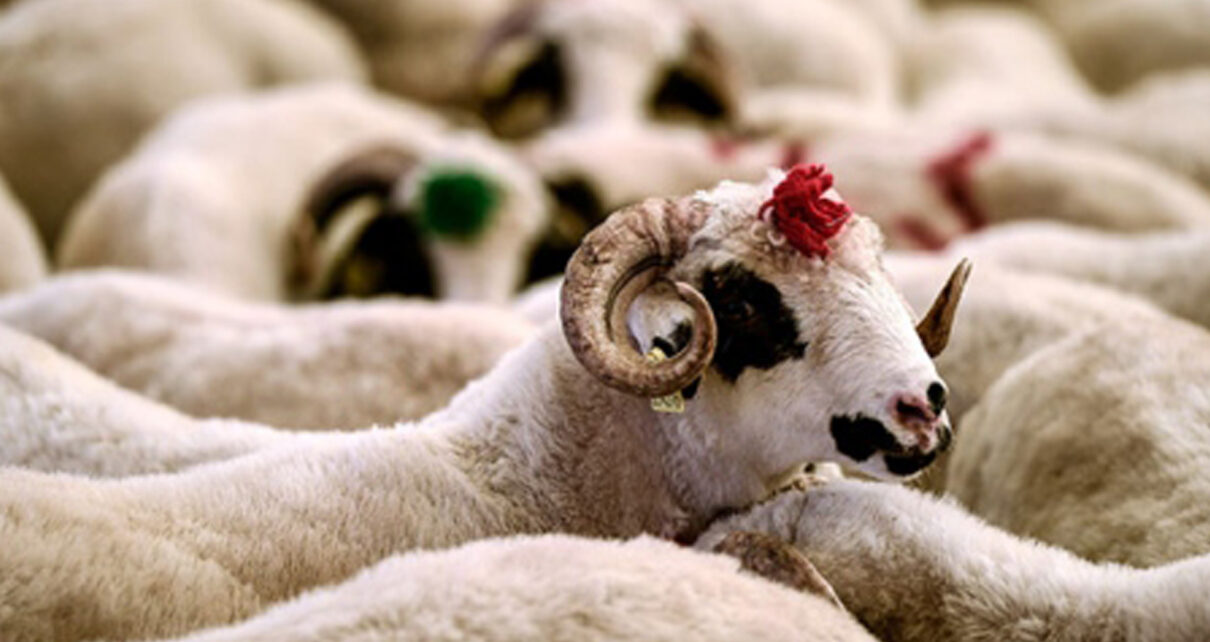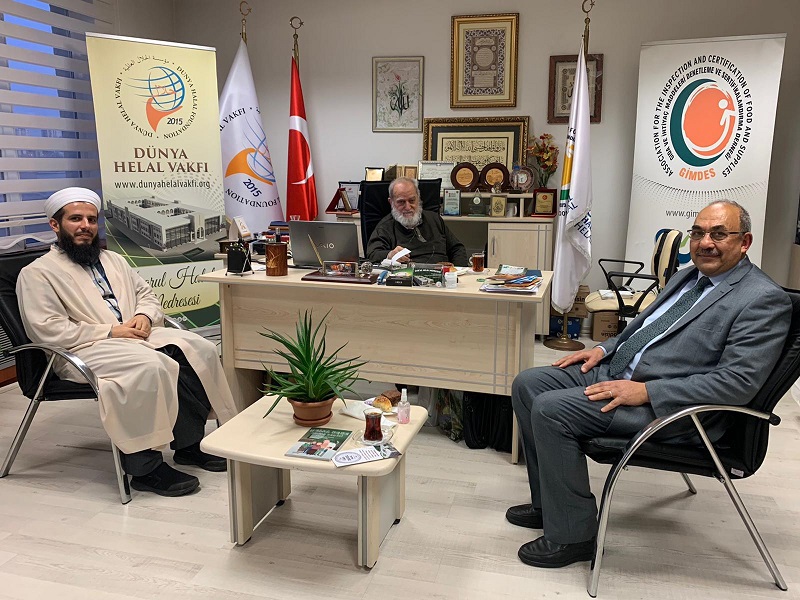GIMDES President Dr. Hüseyin Kâmi BÜYÜKÖZER’s press release on the principles that Halal and Tayyib conditions must be followed in sacrifice slaughter.
Sacrifice is the slaughtering of a special animal at a specific time with the intention of worship in order to approach the mercy of our Almighty Lord. It was ordered in the second year of the Hijrah. Sacrifice is a sign of sacrifice in the way of truth. It is a thankfulness for the blessings given by our Almighty Lord. The result of this is rewards and protection from certain calamities.
Sacrificing a sacrifice on Eid al-Adha with the intention of worship is obligatory for everyone who meets certain conditions, such as being Muslim and rich.
Sacrifice is a financial act of worship that has various benefits for both the individual and society. Sacrifice revives the spirit of brotherhood, cooperation and solidarity in society. If the meat of the sacrificed sacrifice is given to the needy people who do not have the means, both their hearts will be taken and the pleasure of our Lord (Jalla Jala Jalâluhu) will be gained.
Our Prophet (Sallallahu Alaihi wa Sallam) never abandoned sacrifice. The Qur’anic command to our Prophet (Sallallahu Alaihi wa Sallam), “Pray for your Lord and sacrifice” (Surah al-Kawsar, Verse 2.) covers the entire Ummah of Muhammad. In addition, in many hadiths, our Prophet (Sallallahu Alaihi wa Sallam) ordered those who have the means to sacrifice and emphasized the importance of sacrifice by saying: “Whoever has the means but does not sacrifice should not approach our mosque” (Ibn Majah, Edahi,2).
Who is obligatory to sacrifice?
Sacrifice is obligatory for those who meet the following conditions.
- Becoming a Muslim
- Being smart
- Having reached the age of puberty.
- To be free
- To be a resident.
- Being rich. (Having the nisab amount of wealth. The nisab for sacrifice does not require that a year has passed since the money was paid, as is the case for sadaqah al-fitr).
Type of animal to be sacrificed
Only sheep, goats, cattle, buffaloes and camels can be sacrificed. Domestic animals such as chickens, roosters, ducks, geese and wild animals whose meat is eaten are not sacrificed. Sheep and goats must be over one year old. However, sheep can be sacrificed if they are seven or eight months old but look like they are over a year old. Cattle and buffaloes can be sacrificed when they are two years old and camels when they are five years old. Sheep and goats can only be sacrificed for one person. Camels, cattle and buffaloes can be sacrificed jointly by one person up to seven people.
Subscribe to DeepL Pro to edit this document. Visit www.DeepL.com/pro for more information.
Sacrificing Partners
Each of the partners in the sacrifice must be a Muslim and they must sacrifice with the intention of worship for the sake of Allah. Therefore, if one of the partners is not a Muslim, or if he slaughters the sacrifice not for the sake of Allah, but for meat or with some other intention, then none of their sacrifices will be valid. When the partners separate their shares of the sacrificial meat, they must weigh it. They cannot decide by eye.
Whether the victim is at fault or not
The animal to be slaughtered must not have any defect that prevents it from being sacrificed.
Defects that do not harm the sacrifice of an animal;
- Cross-eyed, lame, mangy and crazy,
- Congenitally hornless or with a broken horn,
- Ears pierced or split transversely,
- His ears were cut off at the tips,
- A few of your teeth have fallen out,
- Lack of sexual organs or twisted and sterilized.These animals can be sacrificed.
Defects that harm the sacrifice of an animal;
- To be cripplingly ill, weak and weak,
- Being blind in one or both eyes,
- All or most of your teeth have fallen out,
- One or both horns are broken at the root,
- More than half of the ear or tail has been cut off,
- The absence of an ear or tail,
- The heads of her breasts are detached. These animals cannot be sacrificed.
Sacrifice Time
In order for the Qurban to be valid, it must be slaughtered at the appointed time. The time for the sacrifice is the first three days of Eid al-Adha, i.e. the 10th, 11th and 12th days of the month of Dhu’l-Hijjah. It can be slaughtered on the third day until the sun sets. But it is more virtuous to slaughter on the first day. It is makrooh to slaughter the sacrifice at night. According to the Shafi’i madhhab, the sacrifice can also be slaughtered on the fourth day of Eid.
How the Sacrifice is Slaughtered
The animal to be sacrificed must not be made to suffer and must not be tortured. Animals should be slaughtered by competent people and the slaughtering process should be carried out quickly. In addition, care should be taken to ensure that animals are not kept side by side during slaughter so that they can see each other being slaughtered. The victim is taken to the place of slaughter without being hurt. The animal is laid on its left side facing the qibla. It is considered appropriate to recite the following verses while laying the animal down:
“I have turned my face to the Creator of the heavens and the earth as one who turns to the truth, and I am not of those who associate partners with Allah.” (Surat al-An’am, Verse-79)
“Verily, my prayer, my worship (sacrifice), my life and my death are all for Allah, the Lord of the worlds. He has no partner.” (Surat al-An’am, Ayat-162/163)
Then say, “O Allah! Accept this sacrifice from me as you accepted it from your friend Abraham and your Messenger Muhammad,” or something similar, and then say the takbir. Then the slaughterer takes care not to torment the animal and slaughters it by saying “Bismillahi Allahu Akbar”. The slaughter is done by cutting the jugular veins on both sides of the throat and the esophagus and windpipe, and the animal is allowed to bleed for a while.
It is makrooh for the owner to slaughter the Qurban if he is able to do so, but if not, he can have it slaughtered by giving a proxy to a Muslim he deems appropriate. It is mustahabb for the owner to be present during the slaughtering. If the proxy slaughters the sacrifice, the owner of the sacrifice also participates in the besmela. If the slaughterer forgets to say the besmela, the meat of the sacrifice is permitted to be eaten. However, if he does so intentionally, the meat of the animal is inedible.
What to do about the meat and skin of the sacrificed animal
It is permissible for the owner, whether rich or poor, to eat the meat of the slaughtered sacrifice himself or to feed and distribute it to non-poor people. It is mustahabb to divide the meat into three parts, one part should be consumed by the owner and his dependents, the second part should be given as a gift to neighbors, relatives and acquaintances, even if they are rich, and the third part should be distributed to poor people who do not sacrifice. However, if one’s dependents are large or in need, it is makrooh to consume the meat at home without distributing it to anyone else. The skin of the sacrificial animal can be given as charity, or it can be used to make household items such as prayer rugs and tableware, or it can be given as a gift to someone to be used. It is makrooh to shear the animal before slaughtering it. If the wool is sheared, it should be given as charity. But after the animal is slaughtered, its wool can be sheared and used. It is makrooh to benefit from the milk of the sacrificial animal or to sell its meat or skin. If it is sold, the money must be given as alms.





